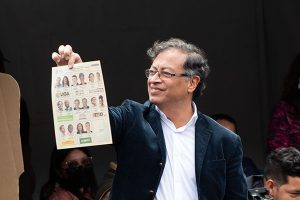Bloomberg
Colombia’s presidential election this weekend is more than just a choice between political models —it’s a contest that’s dividing the generations like no other.
Gustavo Petro, 62, a former guerrilla fighter who says he wants to end an economic model based on oil and coal, has a wide lead among younger voters who grew up during during the relative peace of the last decade.
But many of their parents, who remember the civil conflict of the 1980s and 1990s, are appalled by the idea of electing someone who was in a group that committed acts of terrorism. The result is likely to hinge on how many of them are sufficiently outraged to back Rodolfo Hernandez, Petro’s similarly controversial rival for the presidency, and how many abstain.
Unlike all other major Latin American nations, Colombia has only ever been governed by conservatives and liberals, never by a leftist like Petro. With polls suggesting a tight race, Sunday’s outcome will also depend on how many younger voters turn out to cast their ballot.
“There’s a generational conflict, with a youth that wants change,†Petro said in an interview last month. “They reject human rights violations, and they reject an economy that ransacks nature.â€
Across Colombia, parents and their children are at odds over the election.
Sara Poveda, an 18-year-old sociology student who’s voting for the first time, says she’s backing Petro, among other reasons because she likes his plans for a transition away from fossil fuels, which account for about half of the nation’s exports.
But her father, a retired member of the air force, believes Petro to be a danger who could turn Colombia into an impoverished authoritarian state like neighboring Venezuela. He’s backing Hernandez, 77.
“Whenever we get onto politics in our house, there’s a huge argument,†Sara Poveda said. “We prefer not to talk about these topics at the dinner table, because it ruins the moment for us.†Her father Ricardo said that his first-hand knowledge of the worst era of violence and kidnappings by Marxist guerrillas gives him a different perspective.
“I didn’t hear about it, or read about it— I experienced it,†he said. “The young people haven’t had that experience, even though they’re very intelligent and they’re right about a lot of things.â€
In this election, age appears to be a stronger predictor of how a Colombian will vote than social class or gender, said Carlos Lemoine, founder of the polling company National Consulting Center, or CNC.
“Petro’s success is practically based on the youth vote,†Lemoine said.
 The Gulf Time Newspaper One of the finest business newspapers in the UAE brought to you by our professional writers and editors.
The Gulf Time Newspaper One of the finest business newspapers in the UAE brought to you by our professional writers and editors.
